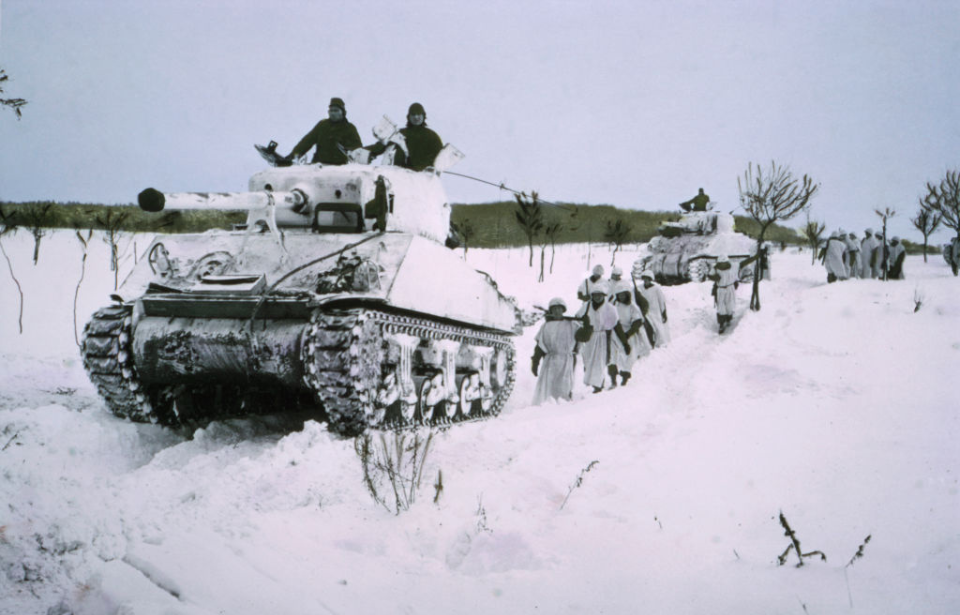When you ask someone about a wartime Christmas truce, they’re more likely to bring up the one that occurred along the Western Front in 1914. What many might not realize is that a much smaller one occurred in 1944, during the Battle of the Bulge, which saw a small act of Christmas decency occur on the frontlines, resulting in a mini truce of sorts.
Battle of the Bulge
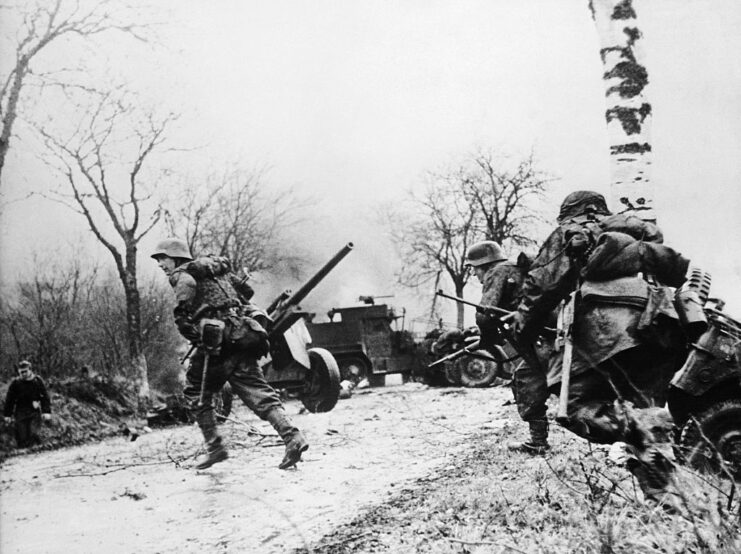
The Battle of the Bulge, occurring from December 1944 to January 1945, was the German forces’ last major offensive in Western Europe. Following D-Day, the Allies made a rapid advance across Europe, ending up in the Ardennes Forest in Belgium. Given it featured harsh terrain and extreme weather conditions (it was nearly winter, after all), the decision was made to temporarily stop there and allow for reinforcements and supplies to be brought in.
It was believed the Germans wouldn’t launch an attack in these conditions, but, desperate to return the tides of war to their side, they did, sending over 406,000 troops into battle on December 16. Intense fighting followed, with both sides using the terrain to their advantage.
Eventually, the Germans found themselves on the losing side. By Christmas time, they’d found themselves trapped in a narrow corridor near Foy-Nôtre-Dame. This, paired with the newly-arrived Allied air support, sealed their fate, with the Allies securing their hard-fought victory by January 28.
Having dedicated much of the remainder of their fighting force to the offensive, the Germans found themselves having exhausted all efforts in Western Europe.
A knock at the door on Christmas Eve
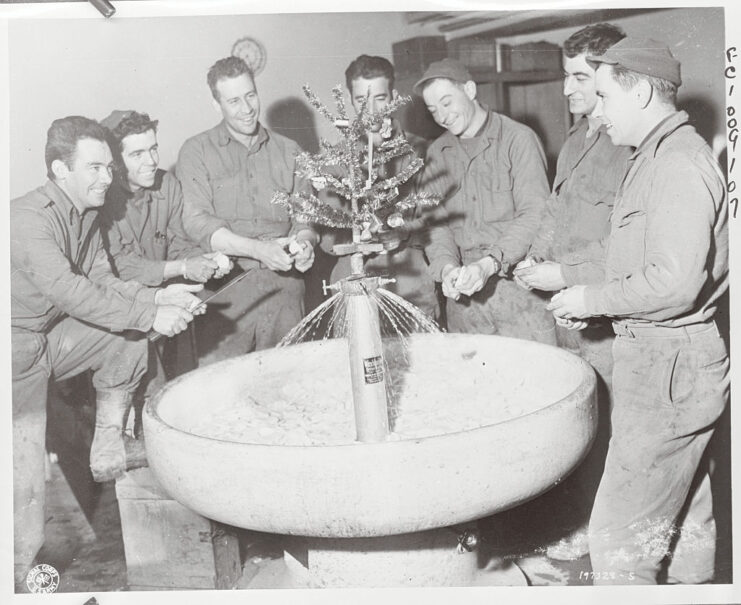
The fighting in the Ardennes was long and hard, and soldiers on both sides found themselves exhausted and in need of a break. A minor opportunity for one occurred on Christmas Eve 1944, in what’s now been deemed a minor truce in the heat of battle.
Our story centers around 12-year-old Fritz Vincken, who, with his mother, Elisabeth, moved to the Hürtgen Forest in Germany, near the Belgian border, after their hometown of Aachen was destroyed as a result of the continued fighting. On Christmas Eve, the two heard a knock at their door. Outside were three American soldiers, one of whom was gravely injured.
Despite the language barrier – the Americans couldn’t speak German and the Vinckens didn’t understand English – the group was able to communicate in French, with Fritz’s mother letting the trio into the home, where they had a touching conversation.
“We learned that the stocky, dark-haired fellow was Jim; his friend, tall and slender, was Robin,” Fritz later recalled. “Harry, the wounded one, was now sleeping in my bed, his face as white as the snow outside. They’d lost their battalion and had wandered in the forest for three days, looking for Americans, and hiding from the Germans. They hadn’t shaved, but still, without their heavy coats, they looked merely like big boys. And that was the way mother began to treat them.”
A second knock at the door
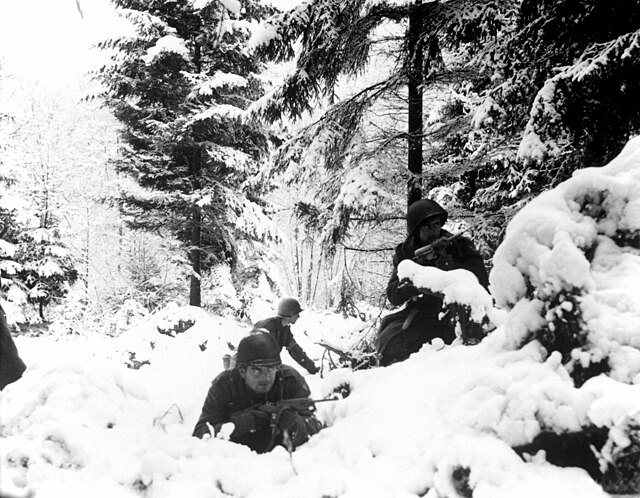
As Fritz Vincken’s mother made their guests a dinner of potatoes and a rooster, a second knock came at the door. Believing the men outside to be American, the 12-year-old opened the door without hesitation, only to realize that the group of four weren’t Allied troops – they were Wehrmacht soldiers.
The men explained that they’d lost their battalion and were looking for a place to hunker down until morning. Fritz grew nervous, aware that harboring enemy troops – in this case, the Americans – was a crime punishable by death. Elisabeth Vincken allowed the four to enter, but informed them that they already had guests whom they “may not consider friends.”
While the Germans were initially upset, Elisabeth cooled down the situation. “Listen. You could be my sons, and so could they in there,” she told them. “A boy with a gunshot wound, fighting for his life, and his two friends, lost like you and just as hungry and exhausted as you are. This one night, this Christmas night, let us forget about killing.”
A short-lived truce on Christmas Eve 1944
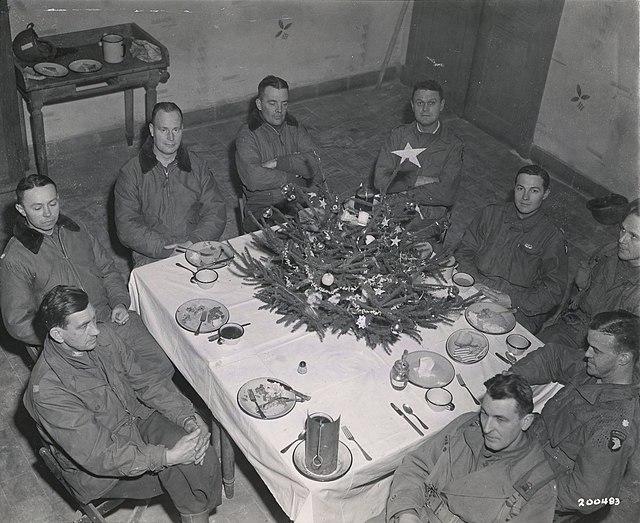
The Germans left their arms at the door and entered the Vincken residence, after which the Americans did the same. After some time, the group loosened up, realizing that, at that particular moment, they weren’t enemies fighting on the battlefield, they were men celebrating Christmas Eve together. Before long, everyone had tears in their eyes.
As Fritz explained, “Relaxation was now beginning to replace suspicion. Even to me, all the soldiers looked very young as we sat there together. Heinz and Willi, both from Colonge, were 16. [Their] German corporal, at 23, was the oldest of them all.”
The corporal pulled out a bottle of red wine from his bag, while Willi offered up the rye bread he had with him. After saying grace, the unusual group – an innocent mother and her young son, three American soldiers and four Germans – began eating their meal, all hungry after a long day. One, who’d been a medical student before the Second World War, even looked at Harry, deeming that he needed “rest and nourishment” and adding that the cold temperatures had saved him from infection.
“Just before midnight, Mother went to the doorstep and asked us to join her to look up at the star of Bethlehem. We all stood beside her except Harry, who was sleeping,” Fritz recalled. “For all of us during the moment of silence, looking at the brightest star in the heavens, the war was a distant, almost-forgotten thing.”
Going their separate ways on Christmas Day
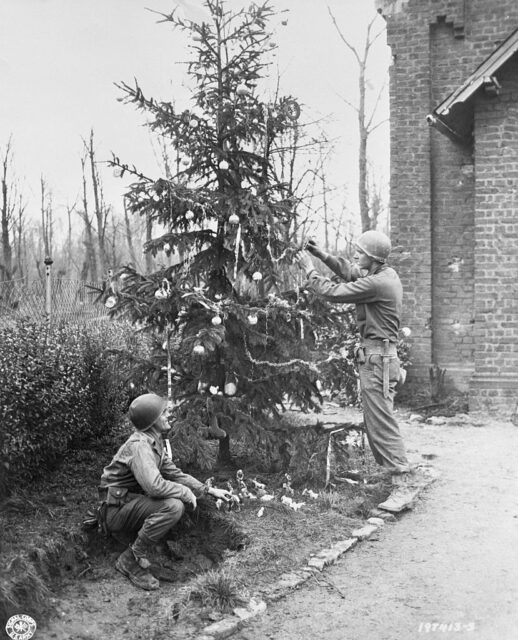
The next morning, everyone had a makeshift breakfast, including Harry, who’d regained some of his strength in the night. After this, a makeshift stretcher was crafted from two poles and the Vinckens’ tablecloth, which the other two American soldiers would use to transport their wounded comrade. Before leaving, the three Americans checked their location on a map and, with the help of the German corporal, plotted their route back to their own lines. The 23-year-old even handed them a compass.
Before long, the Germans and Americans were handed back their weapons, after which they shook hands and went their separate ways. As they left, Elisabeth bid them farewell, saying, “Be careful, boys. I want you to get home someday where you belong. God bless you all!”
Fritz Vickens hoped to reunite with the soldiers one day
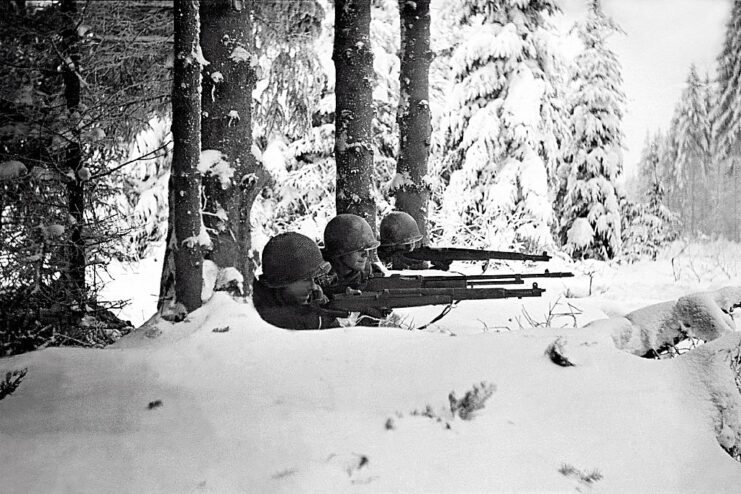
Just before World War II came to an end, Fritz Vincken’s father, Hubert, returned home to his family. In 1959, he emigrated to the United States and opened a bakery in Honolulu, Hawaii. While building a life for himself in the US, he always remembered the soldiers he met on Christmas Eve 1944 and the mini truce that had occurred in that small cottage in the Hürtgen Forest.
In 1953, aware his chances of seeing the men again were slim, Fritz published his story in Reader’s Digest, an article US President Ronald Reagan referenced in 1985. Nine years later, he appeared on an episode of Unsolved Mysteries (1987-2002), intending to bring his story to a wider audience.
The television appearance worked, with a nursing home chaplain in Frederick, Maryland, contacting the producers of Unsolved Mysteries to inform them of a resident who’d served with the 121st Infantry Regiment, 8th Infantry Division during WWII. Fritz flew to Maryland and met Ralph H. Blank, who, at 76, was in poor health.
Their reunion was captured on camera, with Ralph telling him that his “mother saved my life,” indicating he was the “Harry” in Fritz’s story. Following their meeting, he told the Honolulu Star-Bulletin, “Now I can die in peace. My mother’s courage won’t be forgotten and it shows that goodwill will do.”
More from us: Why Did Japan Attack Pearl Harbor?
Fritz added in a 1997 interview that Elisabeth’s actions during the Christmas truce in 1944 taught him an important lesson, “The inner strength of a single woman, who, by her wits and intuition, prevented potential bloodshed, taught me the practical meaning of the words ‘good will toward mankind.’ I remember mother and those seven young soldiers, who met as enemies and parted as friends, right in the middle of the Battle of the Bulge.”
